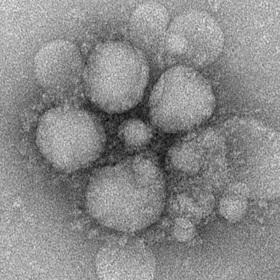Using AI to control energy for indoor agriculture
30 September 2024
Published online 28 April 2014

Cynthia Goldsmith/Maureen Metcalfe/Azaibi Tamin/CDC
This week the Saudi Arabian Ministry of Health confirmed 10 new MERS infections and two more deaths as a result of the virus. In Egypt, a case was confirmed at the weekend of a man who had returned to his country from the Saudi capital, Riyadh.
The MERS virus emerged in April 2012 and has since spread to North Africa, Asia, and Europe. But Saudi Arabia has been the worst affected; it has reported 127 cases in April alone, bringing its total number of confirmed cases to 323, of which 94 have been fatal.
Muslims from around the world will pour into to Saudi Arabia in July for Ramadan, and with the annual Hajj pilgrimage scheduled for October, this recent surge in inflections has revived fears of an epidemic. The Saudi Arabian government is under increasing pressure to be seen to be taking action.
The health minister has been replaced, and the Ministry of Health has invited the World Health Organization (WHO) and a team of international experts to reassess the situation. Representatives of one international drugs company are scheduled to visit to discuss development and manufacture of the vaccine, a Ministry of Health spokesperson told the Saudi Gazette . Other vaccine-makers have also been invited.
The company, Pennsylvania-based Inovio Pharmaceuticals, is developing a synthetic DNA vaccine encoding the MERS "spike" protein, designed to mimic an infection and elicit an immune response. According to Inovio, the vaccine is based on genetic information from multiple virus strains, so as well as protecting against those strains, it might also protect against similar strains, and possibly emerging ones.
Last November, the company released preclinical data giving evidence that "the vaccine constructs were observed to induce strong neutralizing antibodies and broad CD8+ T cells in mice."
Several months earlier, a team of Spanish researchers reported that they have genetically engineered a weak strain of the MERS virus that could also be used to produce a vaccine.
If it proves successful in animal studies, Inovio's vaccine could be ready for testing in humans within five years. According to some experts, however, it's not worth spending large amounts of money on immunization against a virus that has caused a relatively small number of infections.
"There are enormous problems with the idea of a MERS vaccine," virologist Ian Jones of the University of Reading told Reuters . "I can see it works as an appeasement – that they want to say they can make it - and biochemically of course they could, but practically it doesn't make any sense."
A better approach would be to identify the source of the virus and try to prevent its transmission instead.
Bats are a possible source – transmission could occur by eating food contaminated with bat droppings, for example. Camels are another – some of the recent cases involved people who had been in contact with them, and a study this year showed that Saudi's camel population has been carrying the MERS virus since 1992ref..
A WHO report on 24 April says the number of global laboratory-confirmed cases of human infections has reached 254, including 93 which were fatal. MERS belongs to the same family of viruses that cause flu and the common cold, so basic hygiene measures, such as washing hands regularly, and avoiding touching eyes, nose and mouth, greatly reduce the risk of transmission and help prevent its spread.
doi:10.1038/nmiddleeast.2014.107
Stay connected: